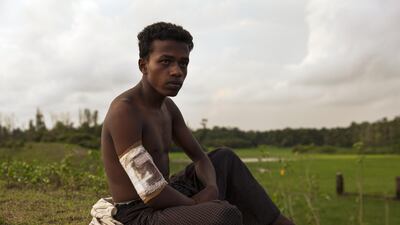Myanmar insisted on Friday it was not barring aid workers from Rakhine state, where a counter-insurgency campaign has sparked an exodus of Muslim Rohingya refugees, but said authorities on the ground might restrict access for security reasons.
Nearly 400,000 Rohingyas have fled to Bangladesh to escape a military offensive that has been described as ethnic cleansing, and raised fears of an unfolding humanitarian crisis.
US deputy assistant secretary of state Patrick Murphy was due in Myanmar this weekend to voice Washington's concerns and press for greater access to the conflict area for humanitarian workers, the state department said.
But Myanmar's government spokesman Zaw Htay insisted, "We don’t block anyone.We don’t block any organisations sending aid to those areas but they might have some difficulty travelling where access is restricted by local authorities for security reasons."
It was unclear whether Murphy would be visiting Rakhine state, and Zaw Htay declined to say whether any request by the US diplomat would be granted.
The military offensive was launched in response to coordinated attacks on police posts and an army camp by fighters from the Arakan Rohingya Salvation Army (ARSA. A dozen people were killed in the attacks.
The crisis has raised questions about predominantly Buddhist Myanmar's transition to civilian rule under the leadership of Nobel Peace laureate Aung San Suu Kyi following decades of military rule.
The generals still control national security policy but, nevertheless, Suu Kyi has been widely criticised abroad for not condemning the violence. The campaign against the Muslim insurgents is popular at home.
US senate majority leader Mitch McConnell said Suu Kyi had assured in a phone call on Thursday that she was working to get aid to areas affected by violence.
'GOVERNMENT-LED' AID EFFORT
Myanmar's minister of social welfare, relief and resettlement, Win Myat Aye, said that for the time being, no independent foreign aid groups were getting access to the conflict area, but he declined to say if they were being blocked.
"These are government-led activities," he said.
The violence in Rakhine and the exodus of refugees is the most pressing problem Suu Kyi has faced since becoming national leader last year.
Rights monitors and fleeing Rohingya say the army and Rakhine Buddhist vigilantes have mounted a campaign of arson aimed at driving out the Muslim population.
UN secretary-general Antonio Guterres and the UN Security Council have urged Myanmar to end the violence, which he said was best described as ethnic cleansing.
Myanmar rejects such accusations, saying its security forces are carrying out clearance operations to defend against ARSA, which the government has declared a terrorist organisation.
The insurgents have declared a month-long unilateral ceasefire to enable aid groups to help but the government rejected it, saying it did not deal with terrorists.
The government has alsoaccused some aid groups of helping the insurgents with food supplies.
The aid group Médecins Sans Frontières has reports of its clinics in Rakhine being burned down and called for "unfettered access to people in desperate need”.

